
20/04/2018
The 3rd European Conference on Translational Bioinformatics brings together more than 130 experts
Attendees discussed the recent advances in information technologies that are facilitating translational research and precision medicine.
The 3rd European Conference on Translational Bioinformatics (ECTB2018) was held on April 16th-17th at the premises of the Barcelona Biomedical Research Park (PRBB) with the attendance of more than 130 European scientists, developers and entrepreneurs, interested in translating genomics and bioinformatics research into healthcare tools and services. The conference aimed to give the participants a unique experience and a forum for discussing fresh scientific results in the translational domain.
The conference brought together world-leading scientists in the area which highlighted on their presentations the recent advances in information technologies that are facilitating translational research and precision medicine. Some of the topics addressed were Big Data integration and analysis, Personalized Medicine, Genome Sequencing initiatives, etc, delivered by scientists from Europe, Canada and the USA.
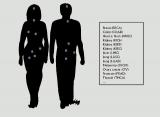
10/04/2018
Major milestone reached in effort to identify cancers’ genetic roots
The project Cancer Genome Atlas details genetic mutations driving cancer in 27 papers published on 5 April in Cell Press journals. One of the studies is led by Washington University and has the participation of the head of the Computational RNA Biology group of GRIB, Eduardo Eyras.
An international team coordinated by the National Institutes of Health (NIH) have reached a major milestone in describing the genetic landscape of cancer. The researchers have completed the genetic sequencing and analyses of more than 11,000 tumours from patients, spanning 33 types of cancer. These are part of The Cancer Genome Atlas (TCGA) project, launched in 2005 to pursue the genetic basis of cancer.
Eduardo Eyras has participated in the study of the splicing alterations in tumours. "These analyses reveal that a significant number of mutations studied previously were poorly classified, and it could be more relevant than was thought to understand cancer and for the identification of therapeutic strategies", describes Eyras.
Article Ref.: Jayasinghe RG, Cao S, Gao O, Wendl MC, Vo NS, Reynolds SM, Zhao Y, Climente-González H, Chai S, Wang F, Varghese R, Huang M, Liang WW, Wyczalkowski MA, Sengupta S, Li Z, Payne SH, Fenyö D, Miner JH, Walter MJ. The Cancer Genome Atlas Research Network, Vincent B, Eyras E, Chen K, Shmulevich I, Chen F, Ding L. Systematic Analysis of Splice-Site-Creating Mutations in Cancer. Cell Rep, 2018; 23(1): 270-281.e3. DOI: 10.1016/j.celrep.2018.03.052.
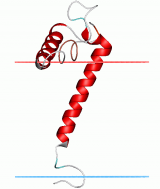
10/04/2018
Nou pas per entendre l’origen dels gens
Han identificat centenars de fragments del genoma sense funció aparent, que tenen capacitat per generar noves proteïnes i, potencialment, convertir-se en nous gens
Com es van crear els blocs bàsics que serveixen per construir qualsevol ésser viu, els gens? És la pregunta que un recent estudi liderat per investigadors del Grup de Genómica Evolutiva del GRIB led by Mar Albà ha intentat resoldre.
El treball, que acaba de publicar la revista Nature Ecology and Evolution, ha permès identificar, mitjançant tècniques de seqüenciació massiva, una gran quantitat de proteïnes noves en el genoma del ratolí. "Aquest treball mostra que un procés anàleg a la formació de gens nous que va tenir lloc al principi de la vida continua actiu avui en dia", explica la Dra. Mar Albà, "queda molta feina per fer per entendre completament l'impacte dels gens de novo en l'evolució recent, però cada vegada tenim més evidència del fet que tenen un pes important".
Article de referència
Jorge Ruiz-Orera, Pol Grau-Verdaguer, José Luis Villanueva-Cañas, Xavier Messeguer, M.Mar Albà. Translation of neutrally evolving peptides provides a basis for de novo gene evolution. Nature Ecology and Evolution, 19 Jan 2018.
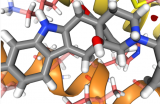
03/04/18
Thesis lecture of Ismael Rodríguez Espigares: "GPCRmd - A web platform for collection, visualization and analysis of molecular dynamics data for G protein-coupled receptors"
Next Wednesday, 4th April 2018 at 10h, Ismael Rodríguez Espigares, member of the GPCR drug discovery group of GRIB will defense his thesis "GPCRmd - A web platform for collection, visualization and analysis of molecular dynamics data for G protein-coupled receptors" at the Charles Darwin room, placed at the inner square of the PRBB building (Dr. Aiguader, 88).You are all invited to this event.

20/03/2018
First genetic study of primate hibernation in their natural environment
The Evolutionary Genomics research group of GRIB (IMIM-UPF), led by Mar Albà, has just published an article in the journal Molecular Ecology providing the results of a study that has identified which genes participate (change their expression) in the hibernation state of hairy-eared dwarf lemurs, which belong to the only group of primates that has the ability to hibernate. These small mammals store fats in their tails, allowing them to survive the months of shortage, and which they use as fuel during hibernation. Hibernation is a response to the lack of resources we normally associate with winter, but which can occur in other conditions of scarcity, such as in desert areas or, for example, during the dry season in Madagascar.
"These types of studies put unique species like this in the spotlight and serve to show that we must preserve our biodiversity. While we continue to dream about spacecraft and interstellar travel, we must not forget that everything starts with a small lemur buried deep in the Madagascan jungle", explains José Luis Villanueva-Cañas.
Reference article: Faherty SL*, Villanueva-Cañas JL*, Blanco MB, Albà MM, Yoder AD. Transcriptomics in the wild: hibernation physiology in free-ranging dwarf lemurs. Molecular Ecology, 29 Jan 2018
21/03/2018
XI Conferencia anual de las plataformas de investigación biomédica
Los días 5 y 6 de marzo se celebró en Barcelona la XI Conferencia Anual de las Plataformas Tecnológicas de Investigación Biomédica: Medicamentos Innovadores, Nanomedicina, Tecnología Sanitaria y Mercados Biotecnológicos, en la que se presentaron diferentes avances en el ámbito de la innovación biomédica disruptiva en el abordaje de diferentes patologías.
La conferencia contó con la participación de más de 50 ponentes y 250 asistentes del sector público y privado. Ferran Sanz, Director del GRIB, junto con Javier Urzay, ambos co-Presidentes de la Plataforma Tecnológica Española de Medicamentos Innovadores, presentaron las actividades realizadas por esta plataforma en 2017.
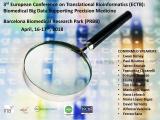
04/12/2017
Join the 3rd European Conference on Translational Bioinformatics: Biomedical Big Data Supporting Precision Medicine
The conference will be held at Barcelona Biomedical Research Park (PRBB) on April 16-17th 2018. This meeting follows on from the success of the European Conference on Translational Bioinformatics (ECTB) series hold in 2016 at the University of Copenhagen, Denmark; and in 2017 at the European Bioinformatics Institute, UK. As in past editions, the 2018 meeting will bring together scientists, developers, and entrepreneurs who are interested in translating genomics and bioinformatics research into healthcare tools and services. The meeting will be relevant for researchers, computational biologists and entrepreneurs from start-ups and established companies interested in epidemiology, cancer genomics and precision medicine.
The Conference is organized by the GRIB (IMIM-UPF) jointly with BSC and supported by the EU project MedBioinformatics and the Spanish Institute of Bioinformatics (INB).
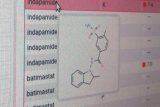
16/03/2018
Thesis lecture of Mari Carmen Carrascosa: "Next generation of informatics tools for big data analytics in drug discovery"
Next Tuesday 20th of March at 11h, Mari Carmen Carrascosa , member of the Systems Pharmacology group of GRIB will defense her thesis "Next generation of informatics tools for big data analytics in drug discovery" at the Classroom number 61.127, placed at the first floor of the Doctor Aiguader building (Dr. Aiguader 80). You are all invited to this event.

8 de març: Concentració pel dia de la dona treballadora
El dijous 8 de març hi ha convocada una concentració a les 11'30h a la plaça interior del PRBB amb motiu del dia de la dona treballadora. El Dia Internacional de les Dones o Dia de la Dona Treballadora és una commemoració anual reconeguda per l'Organització de les Nacions Unides i que denuncia el sexisme i la desigualtat de drets i oportunitats entre homes i dones.
Aquest mateix dia hi ha dues concentracions reivindicatives més, una convocada per les entitats sindicals a les 12 del migdia davant dels Ajuntaments i una a les 18,30 hores, a Passeig de Gràcia amb Diagonal, convocada per diverses organitzacions i institucions per a la celebració d' una manifestació unitària.
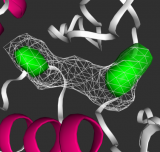
05/03/2018
El GRIB ha aconseguit un doctorat industrial en la convocatòria del 2017
El GRIB ha obtingut un ajut de Doctorat Industrial a la convocatòria 2017 d'aquest programa gestionat per l'AGAUR que vol afavorir la transferència de coneixement al sector productiu.
El projecte anomenat "Play Molecule: Developing a web platform for biomedical applications" anirà a càrrec del doctorand Alejandro Varela, que tindrà com a director de tesi Gianni de Fabritiis, professor d'investigació ICREA i cap del grup de recerca en Biofísica Computacional del GRIB (IMIM-UPF).
El projecte, que es realitzarà amb l'empresa Acellera Labs, consistirà en el desenvolupament de noves eines bioinformàtiques estructurals i la seva implementació a playmolecule.org, una plataforma en línia que ofereix solucions bioinformàtiques a problemes comuns en aquest camp.



